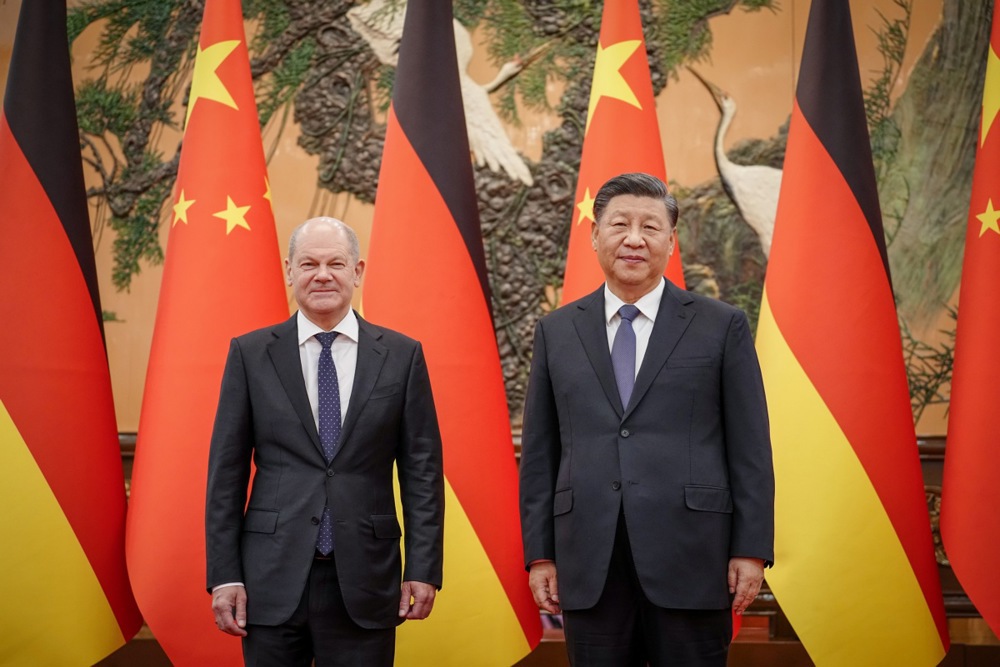Professor Steve H. Hanke, one of America’s leading economists, has some crisp words about America’s economic future, and Europe had better listen. The United States is heading for recession in 2025, says Hanke, and the slow-down could start at the end of this year.
In an exclusive interview with Brussels Signal, Hanke noted Europe has to pay attention to what happens in America, because when the US sneezes, “the rest of the world catches a cold.”
However, before discussing the potential severity of this “cold,” it is important to understand why the economist believes his homeland is headed for a recession.
Hanke, who served on President Reagan’s Council of Economic Advisers, explained that, “based on the well-worn quantity theory of money and historical experience, we know that with a lag, changes in the stock of money drive economic activity and inflation.”
“Since July 2022,” added the 81-year-old applied economist, “the stock of money, measured by M2, has contracted. This is unusual.” For the uninitiated, M2 is a measure of the total money supply that includes all the money in checking accounts (M1) plus savings accounts, time deposits, and money market funds. It gives a broader view of how much money is available in the economy for spending and investing. Hanke warned that “the U.S. has only experienced four other episodes of money supply contraction since the Federal Reserve was founded in 1913.”
These events occurred in the years 1920-1921, 1929-1933, 1937-1938, and 1948-1949.
“Each episode,” noted Hanke, “was accompanied by a recession, or in the case of the 1929-33 contraction, the Great Depression. So, given the current contraction in the money supply, we know that a recession, or at least a notable slowdown, is in the cards and that it will probably arrive in 2025.”
If his prediction proves accurate, how exactly will Europe be affected?
“The US, like China, is a huge economy. Just look at the negative ripple effects that China’s post-Covid slump has had on economic activity around the world, particularly in commodity markets.”
“When it comes to a potential slump in the US, there is also another aspect,” he added, “the effect that such a slump would have on business psychology and confidence. This is particularly important in Europe, where the state of business confidence is already rather low.”
The US and European countries, particularly those in the European Union, are among each other’s largest trading partners. They exchange a wide array of goods and services, from cars and machinery to financial and tech services. When European consumers buy American products or American businesses invest in Europe, it boosts economic activity on both sides of the Atlantic.
According to a recent report by the Brookings Institute, a public policy think-tank, US-EU services trade totalled $411bn in 2022, the most recent year for which data is available. This amount was approximately six times greater than US-China services trade, which stood at $68bn, and 3.6 times higher than EU-China services trade, which amounted to $122bn. Combining goods and services, US-EU trade reached a total of $1.3tn in 2022.
A recession in the US would likely lead to reduced demand for European exports, negatively impacting the EU economy. Investor confidence in the euro would likely diminish, causing the currency to depreciate.
In response to these economic challenges, the European Central Bank (ECB) might implement monetary easing policies, such as lowering interest rates or engaging in quantitative easing. These actions could further reduce the value of the euro relative to other currencies. Central banks in the US and Europe, like the Federal Reserve and the European Central Bank, often coordinate their policies to maintain global economic stability. When the Fed changes interest rates, it can influence European markets and vice versa. This interdependence ensures that economic policies in one region consider the potential impacts on the other.
The inextricable connection between the US and the European continent cannot be overstated, as companies on both sides of the Atlantic invest heavily in each other’s markets. American firms set up operations in Europe to reach more customers and take advantage of local expertise, while European companies do the same in the U.S. These investments create jobs and drive innovation, further binding the two economies together.
Financial markets are also tightly linked. Stock markets in the US and Europe often move in sync because investors frequently react to the same global economic news and trends. A financial crisis in one region can quickly spread to the other, as seen during the 2008 financial crisis, which affected both US and European economies profoundly.
A recession stateside next year would weaken the dollar, which would make European exports more expensive and less competitive in the global market. This exchange rate shift could further strain European economies already grappling with inflation, slow growth, and a shaky housing sector.
Going back to Hanke’s point about confidence, or lack thereof, consumer and business confidence play crucial roles in economic stability. A recession in the US could dampen confidence globally, leading to reduced investment and spending in Europe. The psychological impact of a major economic downturn cannot be underestimated, as it often results in a self-fulfilling prophecy of decreased economic activity.
Finally, considering Joe Biden just announced he is no longer running for re-election and Trump suggests that Vice President Kamala Harris will be easier to defeat, it seemed fitting to ask Hanke what a second Trump term might mean for Europe.
“When coins are flipped and spinning through the air,” he replied, “I’m not in the business of predicting heads or tails.” However, he is in the business of forecasting recessions. And it appears that a particularly harsh one may be just around the corner





Populist-right in Europe needs its own Project 2025